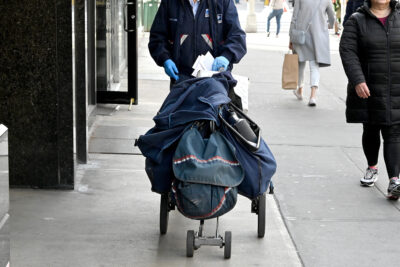ProPublica is a nonprofit newsroom that investigates abuses of power. Sign up to receive our biggest stories as soon as they’re published.
Postal carriers say they are being pressed into service against medical advice and with insufficient protection against the novel coronavirus. Two mail carriers told ProPublica they have been pressured to stay on their routes despite showing symptoms of COVID-19.
One of the workers, in Denver, says he had to keep delivering mail for days while he awaited a doctor’s note. He says the route includes many locations where there are elderly and immunocompromised residents.
In the other case, a letter carrier in the Northwest says he is still delivering mail even after a nurse told him he likely has coronavirus.
Ten letter carriers also told ProPublica that they’ve been given little or no hand sanitizer even though they have little opportunity to wash their hands on their routes. Some postal workers told us they’ve been provided gloves, others said they haven’t. The workers spoke on condition of anonymity.
Experts say if the Postal Service isn’t protecting its workers, it’s not only putting them at risk, it’s also endangering residents and other mail recipients.
“When you look at the mathematics of one postal worker handling hundreds of people’s mail on a daily, continuous basis, the sheer probability increases dramatically,” said Jack Caravanos, clinical professor of environmental public health science at New York University. “You’re contaminating the envelope and presenting a situation where transmission is very likely.”
Caravanos said the Postal Service should be doing daily temperature checks for workers and giving carriers enough sanitizer to clean their hands between each delivery or at least every hour. Workers should also be instructed to stay home if they’re sick, he said, without fear of wage loss or retaliation.
The likelihood that the virus spreads can vary depending on multiple factors — for example, whether a worker hands mail directly to a person or puts it in a mailbox. But experts said it’s critical to take precautions.
“Just assume that your mail has been delivered by someone who has been infected and plan accordingly,” said Peter Hotez, professor and dean of the National School of Tropical Medicine at Baylor College of Medicine.
The experts recommended commonsense protections: Wash your hands or use sanitizer immediately after touching letters and avoiding touching your face or anything else until then. A new study found that the virus can survive 24 hours on cardboard. It’s not clear how long it can survive on paper.
In a statement to ProPublica, USPS spokesman David Partenheimer said, “The safety and wellbeing of our United States Postal Service employees is our highest priority.” Noting experts’ conclusion that there’s little risk of the coronavirus spreading through shipping of packages, Partenheimer said, “We believe our customers should feel safe in receiving their mail as usual.”
The Postal Service did not address specific questions about how the agency has addressed the risk of spreading the virus through mail delivery by sick employees, mail carriers being pushed to work despite symptoms, or the lack of hand sanitizer.
Partenheimer said the agency knows of five postal workers who have tested positive for the coronavirus, none of whom are still on the job. That does not include the two postal workers ProPublica spoke with. They have not been able to get tested.
The Postal Service has said it has adopted a liberal sick leave policy in light of the virus. In a video message this month, Postmaster General Megan Brennan encouraged workers to simply stay home if they feel unwell.
But postal workers said the USPS has long pushed employees to avoid taking sick days and managers are still sticking to that.
The carrier in Denver who continued going to work last week despite symptoms said he and his colleagues were told they needed to have a doctor’s note to miss work. He said he came to work until he could get one.
“I was forced to expose others to a potentially deadly virus because of policies based on a predetermined attitude that all carriers are lazy and cheaters,” the Denver worker said. He added that when he was still at work, he and other employees were not being provided with hand sanitizer.
On Tuesday, USPS employees created a petition asking their employer to do more to protect employees and the public. It got more than 6,000 signatures in a day.
Two USPS employees in White Plains, New York, reportedly tested positive for coronavirus in March. They work at a mail processing center and have limited contact with the public. The plant closed for 24 hours for cleaning and installed hand sanitizer dispensers in the building.
In its statement to ProPublica, USPS said that because of federal laws protecting employee privacy, it cannot tell local communities when a postal worker becomes sick.
ProPublica also asked FedEx and the United Parcel Service what they are doing to protect employees and the public from exposure to the coronavirus, and whether they are providing delivery workers with hand sanitizer.
“Hand sanitizer has been made available at our facilities,” wrote UPS spokesperson Matthew O’Connor. “If someone exhibits symptoms, they are asked to seek medical care and not to come to work.”
FedEx also said it’s telling employees to take signs of illness seriously. It did not say whether the company is providing hand sanitizer to its workers.
Filed under:



